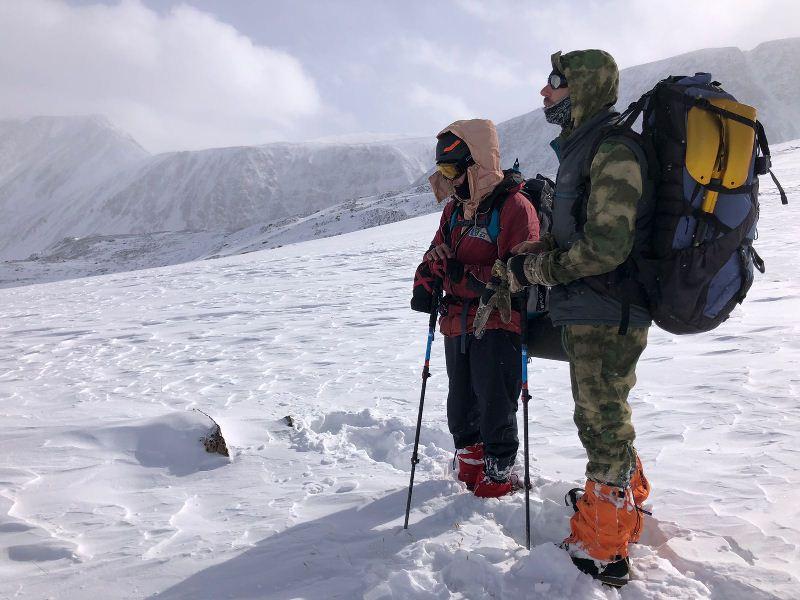11.10.2021

НГУЭУ принял участие в проекте Всемирного фонда дикой природы (WWF) «Горные следопыты», цель которого — объединить усилия альпинистов и биологов для сохранения снежного барса.

В качестве волонтеров проректор по молодежной политике и проектной деятельности Денис Обуховский и преподаватель кафедры финансового рынка и финансовых институтов Жанна Кулешова помогали сотрудникам Сайлюгемского национального парка устанавливать фотоловушки для отслеживания миграции снежного барса в окрестностях ледника Актру на Северо-Чуйском хребте.
Проект по мониторингу снежного барса стартовал в Республике Алтай весной 2021 года. Он проходит при участии сотрудников Сайлюгемского национального парка, альпинистов, скалолазов и горных туристов со всей России в самых труднодоступных очагах обитания ирбиса. Впервые в изучении снежного барса ученым будут помогать альпинисты: устанавливать камеры регистрации, а в дальнейшем — самостоятельно их проверять и передавать данные экспертам.
— В России осталось не более 70-90 особей снежного барса. Основная популяция сохранилась в Горном Алтае, здесь обитает порядка 40 особей редкого хищника, — рассказывает заместитель директора Сайлюгемского национального парка Леонард Таханов. — Ареал ирбиса огромен и труднодоступен, в связи с чем на карте до сих пор остаются «белые пятна», такие как на Северо-Чуйском хребте. Добраться до большинства из них без альпинистских навыков — практически невозможно даже для самых отчаянных исследователей. Добровольцы, имеющие профессиональную подготовку, помогут нам охватить мониторингом ранее не изученные территории. Мы рады, что теперь у нас есть такие партнеры. Благодарим НГУЭУ за участие в проекте и надеемся на дальнейшее сотрудничество.
Проректор Денис Обуховский подчеркнул, что экологическая повестка — важнейшее направление в рамках реализации «третьей миссии» НГУЭУ.
— Но надо понимать, что экологическая повестка воспринимается нами не только в локальном масштабе, это история не только про университет. Это участие в глобальной работе по сохранению общей экосистемы нашей замечательной планеты. Поэтому мы рады, что получилось включиться в такой уникальный и интересный проект, как изучение и сохранение снежного барса на Алтае, — добавил он.
Отметим, что поддержку проекту оказали сторонники WWF и Банк ВТБ. Партнером выступила Федерация альпинизма и скалолазания Республики Алтай.
NSUEM took part in the snow leopard preservation project in Altai Mountains
NSUEM took part in the Mountain Pathfinders’ project of the World Wildlife Fund (WWF) with the purpose to unite the efforts of alpinists and biologists to preserve the snow leopard species.
Two of our staff members volunteered to assist the employees of the Sailugem National Park. Denis Obuhovskij, Vice-Rector for Youth Policy and Projects, and Zhanna Kuleshova a lecturer at the Department of Financial Market and Financial Institutions helped to install camera traps to track the migration of snow leopards in the vicinity of the Aktru glacier.
The snow leopard monitoring project started in the Altai Republic in the spring 2021 and is possible only through the combined efforts of the Sailugem National Park staff members, alpinists, rock climbers and mountain tourists from all over Russia who can get to the most inaccessible habitats of that wonderful but secretive animal. That is the first time when snow leopard scientists are assisted by alpinists who install the registration cameras and after that will independently carry out the work to check them and transfer the data to the experts.
— There are no more than 70 to 90 snow leopards left in Russia. Primary population is in the Altai Mountains’ region, about 40 individuals of this rare predator live here, says Leonard Takhanov, deputy director of the Sailugem National Park. — The habitat of the snow leopard is huge and inaccessible, and there are still "white spots" on the map, such as those on the Severo-Chuisky ridge of the Aktru glacier. Getting to the most of them without climbing skills and gear is almost impossible for even the most desperate explorers. Volunteers with professional training will help us cover previously unexplored areas with monitoring. We are glad that we now have such partners and grateful to the NSUEM for participation in the project. We are looking forward to the further cooperation.
Vice-rector Denis Obuhovskij emphasized that the environmental agenda is one of the most important direction in the implementation of the "third mission" of the NSUEM.
— We must understand that the environmental agenda is perceived by us not only on a local scale. That is not only a story about the university; it is about participation in the global work to preserve the common ecosystem of our wonderful planet. That’s why we are thrilled to be involved in such a unique and interesting opportunity to study and preserve the snow leopard population in Altai, — he added.
The project was supported by the WWF advocates and VTB Bank together with the partnership of Federation of Mountaineering and Rock Climbing of the Altai Republic.
